- Home
- Warhammer 40K
Lords and Tyrants
Lords and Tyrants Read online
Backlist
More Warhammer 40,000 stories from Black Library
BLACKSTONE FORTRESS
Darius Hinks
• DARK IMPERIUM •
Guy Haley
BOOK 1: DARK IMPERIUM
BOOK 2: PLAGUE WAR
WATCHERS OF THE THRONE: THE EMPEROR’S LEGION
Chris Wraight
• THE HORUSIAN WARS •
John French
BOOK 1: RESURRECTION
BOOK 2: INCARNATION
VAULTS OF TERRA: THE CARRION THRONE
Chris Wraight
• RISE OF THE YNNARI •
Gav Thorpe
BOOK 1: GHOST WARRIOR
BOOK 2: WILD RIDER
• BLACK LEGION •
Aaron Dembski-Bowden
BOOK 1: THE TALON OF HORUS
BOOK 2: BLACK LEGION
Visit blacklibrary.com for the full range of novels, novellas, audio dramas and Quick Reads, along with many other exclusive products
Contents
Cover
Backlist
Title Page
Warhammer 40,000
ARGENT
LUCIUS: PRIDE AND FALL
WHISPERS
THE BATTLE FOR MARKGRAAF HIVE
A BROTHER’S CONFESSION
RISE
FLAYED
A MEMORY OF THARSIS
LEFT FOR DEAD
UNEARTHED
THE AEGIDAN OATH
HIDDEN TREASURES
THE REAPING TIME
THE GREATER EVIL
THE PATH UNCLEAR
SHADOWS OF HEAVEN
About the Authors
An Extract from ‘Dark Imperium: Plague War’
A Black Library Publication
eBook license
It is the 41st millennium. For more than a hundred centuries the Emperor has sat immobile on the Golden Throne of Earth. He is the Master of Mankind by the will of the gods, and master of a million worlds by the might of His inexhaustible armies. He is a rotting carcass writhing invisibly with power from the Dark Age of Technology. He is the Carrion Lord of the Imperium for whom a thousand souls are sacrificed every day, so that He may never truly die.
Yet even in His deathless state, the Emperor continues His eternal vigilance. Mighty battlefleets cross the daemon-infested miasma of the warp, the only route between distant stars, their way lit by the Astronomican, the psychic manifestation of the Emperor’s will. Vast armies give battle in His name on uncounted worlds. Greatest amongst His soldiers are the Adeptus Astartes, the Space Marines, bio-engineered super-warriors. Their comrades in arms are legion: the Astra Militarum and countless planetary defence forces, the ever-vigilant Inquisition and the tech-priests of the Adeptus Mechanicus to name only a few. But for all their multitudes, they are barely enough to hold off the ever-present threat from aliens, heretics, mutants – and worse.
To be a man in such times is to be one amongst untold billions. It is to live in the cruellest and most bloody regime imaginable. These are the tales of those times. Forget the power of technology and science, for so much has been forgotten, never to be re-learned. Forget the promise of progress and understanding, for in the grim dark future there is only war. There is no peace amongst the stars, only an eternity of carnage and slaughter, and the laughter of thirsting gods.
ARGENT
Chris Wraight
I come round, and the pain begins again. It is severe but manageable, so I do not request control measures. I look down and see my arms stripped of their armour, and that momentarily alarms me because I have been armoured for a very long time. I flex my fingers, and the pain flares. Both my forearms are encased in flexplast netting, wound tight, and there are spots of blood on the synthetic fabric. For a moment I look at the dark fluid as it spreads in spidery, blotted lines. My wounds will take a long time to heal even with the assistance of the medicae staff, and that is frustrating.
I realise that the drugs I was given have dulled my senses, and I blink hard and flex my leg muscles and perform thought exercises to restore mental agility.
I take in my surroundings. I am in a cell made of metal floors and metal walls, perhaps five metres by six. A single lumen gives off a weak light, illuminating a narrow desk and an even narrower cot, on which I am lying. The blankets are damp with sweat and tight to my body. I guess that I am back in the ordo command post beyond the Dravaganda ridgeline. I consider whether I am strong enough to move, and place my hands on the twin edges of my cot. Pushing against the metal tells me that I am not – the bones are still broken and incapable of supporting my weight. I could perhaps swing my legs around and stand, though. I would prefer to keep moving, to get my blood flowing again. I am not a child to be protected – I am a grown woman, an interrogator of the Ordo Hereticus, a warrior.
But I do not move, for the door slides open and my master enters. I can tell it is him even before the steel panel shifts, for his armour hums at a pitch I recognise. I believe that he could have chosen to have the telltale audex volume reduced, but he sees no use for stealth and sees many uses for a recognisable signature. To know that he approaches is a cause for dread, and I have witnessed the effect often during actions on terrified subjects.
A part of me dreads his coming too, even now, after I have been a member of his retinue for over a year and served on numerous missions. Inquisitor Joffen Tur cultivates fear as another man might cultivate an appreciation of scholarship or the contents of a hydroponic chamber, and I am not yet entirely immune to his practised aura.
He enters, ducking under the door’s lintel. He is in full armour – dark red lacquer, trimmed with bronze. The breastplate is an aquila, chipped with battle damage. His exposed head is clean-shaven with a bull neck and a solid chin. His eyes do not make a connection with me – as ever, he does not focus, as his thoughts are at least partly elsewhere. A man like Tur is always giving consideration to the unseen.
‘Awake, then, Spinoza,’ he grunts, standing before me.
I attempt to salute, and the pain makes me wince.
‘Don’t bother,’ he says. ‘You’ll be useless to me for another week. Just tell me what happened.’
‘On Forfoda?’ I ask, and immediately regret it. My wits are still slow.
‘Of course on bloody Forfoda,’ Tur growls. ‘You’re in bed, both your arms are broken, you’re a mess. Tell me how you got that way.’
I take a deep breath, and try to remember.
First, though, I must go back further. I must recall the briefing on the bridge of the Leopax, Tur’s hunter-killer. This is only one of the vessels under his command, and not the largest. By choosing it he is sending a signal to the other Imperial forces mustering at Forfoda – this world is not the greatest of priorities for him, he has other burdens to attend to, but he deigns to participate in order to reflect the Emperor’s glory more perfectly and with greater speed.
Tur does not place great store on courtesy, and I admire him for this. He knows his position in the hierarchy of Imperial servants, and it is near the top. One day I aspire to command the same level of self-belief, but know that I have some way to go before I do so.
We assemble under the shadow of his great ouslite command throne – myself, the assassin Kled, the captain of stormtroopers Brannad, the savant Yx and the hierophant Werefol. In the observation dome above us we can see Forfoda’s red atmosphere looming, and it is easy to imagine it burning.
Tur himself remains seated as we bow, one by one. He does not acknowledge us, but rubs his ill-shaven chin as flickering lithocasts scroll through the air before
him.
‘They’re torching everything,’ he says in due course. ‘Damned animals.’
I stiffen a little. He is not referring to the cultists who have brought this world to the brink of ruin, but to the Angels of Death who are now hauling it back to heel. I do not find it easy to hear those blessed warriors described in such terms, as used as I am to Tur’s generally brusque manner. When I first heard that we would be in theatre with the Imperial Fists, I gave fervent thanks to Him on Terra, for it had long been a dear wish of mine to witness them fight.
But my master is correct in this, of course – if we do not extract the leaders of the insurrection for scrutiny then we miss the chance to learn what caused it.
‘I’ll take the primus complex,’ Tur says, squinting at a succession of tactical overlays. ‘We need to hit that in the next hour or it’ll be rubble. Brannad, you’ll come too, and a Purgation squad.’
I am surprised by that. Tur has been insistent for months that I develop more experience in conventional combat, and I had expected to make planetfall with him. He is concerned that my reactions are not quite where they should be, and that I am at risk of serious injury, and so I have pursued my training in this area with zeal.
He turns to me.
‘You’ll take the secondary spire. They’re scheduled to hit the command blister in three hours. Go with them. See they do not kill the target before you can get to her.’
I do not hide my surprise well. ‘By your will,’ I say, but my concern must have been obvious, for Tur scowls at me.
‘Yes, you’ll be alone with them,’ he says. ‘Is that a problem? Do you wish for a chaperone?’
I am stung, and suspect that I blush. ‘No problem,’ I say. ‘You honour me.’
‘Damn right,’ he says. ‘So don’t foul it up.’
The target is the governor’s adjutant Naiao Servia, whom our intelligence places within the secondary spire complex. Her master is holed up somewhere in the central hub, defended well, and thus Tur is correct to devote the majority of his resources there. I cannot help but think that my assignment is more about testing me than utilising our expertise optimally. That is his right, of course. He wishes me to become a weapon after his own design, and in the longer run that goal honours the Emperor more than the fate of a single battlefront.
So I ought to be thankful, and I attempt to remember this as I take my lander down through Forfoda’s red methane atmosphere towards my rendezvous coordinates. I do not know how Tur arranged it – he tells me only what I need to know – but he has persuaded the warriors of the Adeptus Astartes to let me accompany them, and that is testament to the heft his word carries here.
‘Accompany’, though, is a misleading word. I am to serve my master’s will in all things, and his will is that Servia is taken alive. I do not yet know how the Imperial Fists will react to this, and on the journey over I catalogue the many factors weighing on an unfavourable outcome.
I am a mortal. Worse, I am a woman. Worse still, I am a mere interrogator. None of these things are destined to make my task with these particular subjects easy, which is no doubt what Tur intended.
We make planetfall and boost across the world’s cracked plains towards the forward positions. In order to divert my mind from unhelpful speculation, I look out of the viewports. I see palls of burning promethium rising into the ruddy clouds above. I see the hulks of tanks smouldering in the rad-wastes between spires. I see the northern horizon burning, and feel the impact of shells from the Astra Militarum batteries. This front is heavily populated by both sides – there must be many hundreds of thousands of soldiers dug in. A full advance would be ruinous in both human and equipment terms, so I am sure the commanders back in the orbital station would prefer to avoid it.
My transport touches down on a makeshift rockcrete plate set out in the open, ten kilometres behind the first of our offensive lines. I check my armour-seal before disembarking. Yx told me with some relish that I would last approximately ten seconds if I were to breathe Forfoda’s atmosphere unfiltered. Only in the enclosed hives can the citizens exist without rebreathers, and our artillery barrages have compromised even that fragile shell of immunity.
I give my pilot the order to return to the Leopax and make my way towards a low command bunker. On presentation of my rosette I am waved inside by a mortal trooper in an atmosphere suit. His armour’s trim is gold, and he bears the clenched fist symbol of the Chapter on his chest. Just catching sight of it gives me a twinge of expectation.
I am shown inside by more armoured menials, and taken to a chamber deep underground. I enter a crowded room, dominated by six warriors in full Adeptus Astartes battleplate. They are as enormous as I expected them to be. Their armour is pitted and worn, betraying long periods of active service, and it growls with every movement – a low, almost sub-aural hum of tethered machine-spirits.
Intelligence has already given me their names and designations. Four are Space Marines of a Codex-standard Assault squad – battle-brothers Travix, Movren, Pelleas and Alentar. The fifth is a sergeant, Cranach. The sixth is far more senior, a Chaplain named Erastus, and I immediately sense the distinction between them. It is not just the difference in livery – the Chaplain is arrayed in black against the others’ gold – but the manner between them. They are creatures of rigid hierarchy, just as you would expect, and their deference to Erastus is evident.
As I enter, they have already turned to regard me, and I look up at their weather-hammered, scarred faces. The Chaplain’s is the most severe, his flesh pulled back from a hard bone structure and his bald head studded with iron service indicators.
‘Luce Spinoza,’ Erastus says, his voice a snarl of iron over steel. ‘Be welcome, acolyte.’
‘Interrogator,’ I say. It is important to insist on what rank I do have.
Cranach, the sergeant, looks at me evenly. I sense little outright hostility from the others – irritation, perhaps, and some impatience to be moving.
‘Your master cares little for his servants,’ Erastus says, ‘to place them in harm’s way so lightly.’
‘We are all in harm’s way,’ I say. ‘Emperor be praised.’
Cranach looks at Erastus, and raises a black eyebrow. One of the others – Travix, perhaps – smiles.
Erastus activates a hololith column. ‘This is the target,’ he says. ‘The summit of the upper spire thrust. Here is the command nexus – too far to hit from our forward artillery positions, and shielded from atmospheric assault, so we will destroy it at close range. Once the target is eliminated, we will move on, and the Militarum can handle the rest.’
‘The adjutant Servia, present in that location, must be preserved,’ I say. Best to get it out in the open as soon as possible, for I do not know how far Tur has already briefed them.
‘Not a priority,’ Erastus says.
‘It is the highest priority.’
He does not get angry. I judge he only gets angry with obstacles of importance, and I hardly qualify as that.
‘This is why we have been saddled with you, then,’ Erastus says.
‘Fought before, acolyte?’ Cranach asks, doubtfully. He looks at my battle armour – which I am fiercely proud of – with some scepticism.
‘Many times, Throne be praised,’ I say, looking him in the eye. ‘I will not get in your way.’
‘You already are,’ Erastus tells me.
‘The Holy Orders of the Inquisition have placed an interdict on Servia,’ I tell him. ‘She will be preserved.’ I turn to Cranach. ‘Do not call me acolyte again, brother-sergeant. My rank is interrogator, earned by my blood and by the blood of the heretics I have ended.’
Cranach raises his eyebrow again. Perhaps that is his affectation, a curiously human gesture for something so gene-conditioned for killing.
‘As you will it, interrogator,’ he says, bowing.
So that is my fi
rst victory – minor, though, I judge, significant.
‘Study the approach patterns,’ Erastus tells me. ‘If you come with us, you will have to be useful.’
‘I pray I will be so, Brother-Chaplain,’ I say.
‘Why did you say that?’ Tur asked.
‘Say what?’
‘I pray I will be so. That was weak. These are the sons of Dorn. They only respect resolve.’
‘I did not consider my words.’
‘No, you bloody didn’t.’
Something in my master’s tone strikes me as unusual then. Is his speech a little… petulant? I have spent some time with the Adeptus Astartes now, and the contrast cannot help but be drawn.
But that is unworthy. Tur is a lord of the Ordo Hereticus, a witch-finder of galactic renown, and on a hundred worlds his name is whispered by priests with a cross between reverence and fear. He speaks as he chooses to speak, and there is no requirement of an inquisitor to be decorous, especially to the members of his own retinue.
‘Did you understand the attack plan?’ he asks.
‘It was a simple operation, suited to their skills,’ I say. ‘We were to approach the spire using an atmospheric transport, breaking in three levels below the command dome where the shielding gave out. From there to the dome was only a short distance. They would seize it, kill the occupants, set charges to destroy the structure, then break out again to the same transport.’
‘And you ensured they knew what I demanded?’
‘A number of times. They were in no doubt.’
‘Did they know the manner of corruption in the spires?’
‘No. Neither did I. As I recall, at that stage none of us did.’
Tur grunts. He has a surly look about him, perhaps due to fatigue. He has been fighting for a long time, I guess, and there must be many actions still to conduct.
‘Go on, then,’ he says. ‘What happened next?’
I strap myself into my restraint harness within the gunship’s hold. Set beside the Space Marines I feel ludicrously small, even though my armour is the equal of any in the Ordo Hereticus and has performed with distinction in a hundred armed engagements on a dozen worlds.

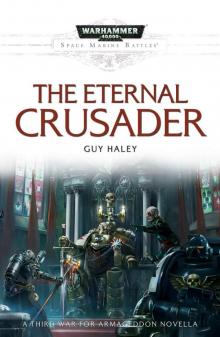 The Eternal Crusader - Guy Haley
The Eternal Crusader - Guy Haley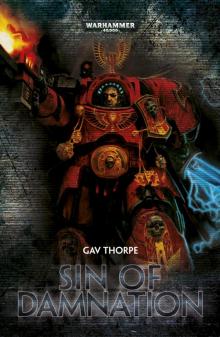 Sin of Damnation - Gav Thorpe
Sin of Damnation - Gav Thorpe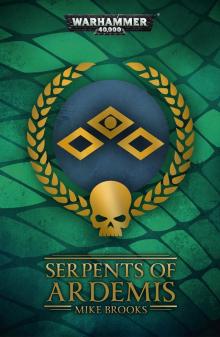 Serpents of Ardemis - Mike Brooks
Serpents of Ardemis - Mike Brooks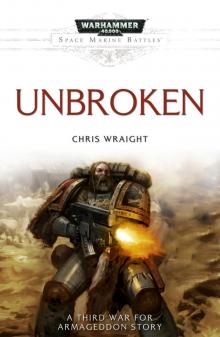 Unbroken - Chris Wraight
Unbroken - Chris Wraight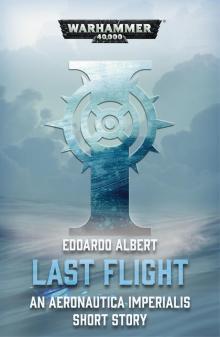 Last Flight - Edoardo Albert
Last Flight - Edoardo Albert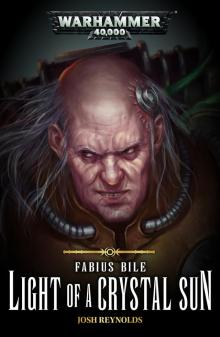 Light of a Crystal Sun - Josh Reynolds
Light of a Crystal Sun - Josh Reynolds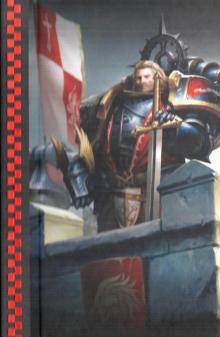 Lion El'Jonson- Lord of the First - David Guymer
Lion El'Jonson- Lord of the First - David Guymer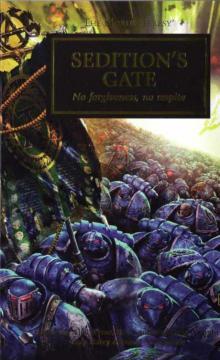 Sedition's Gate - Nick Kyme & Chris Wraight
Sedition's Gate - Nick Kyme & Chris Wraight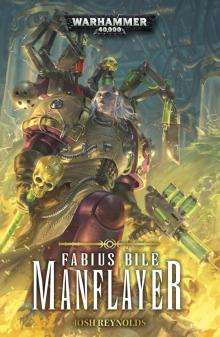 Manflayer - Josh Reynolds
Manflayer - Josh Reynolds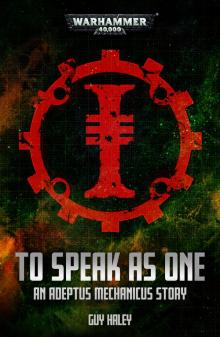 To Speak as One - Guy Haley
To Speak as One - Guy Haley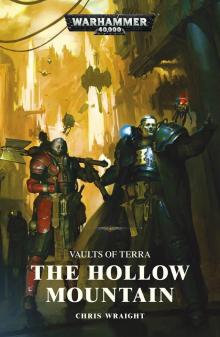 Vaults of Terra- The Hollow Mountain - Chris Wraight
Vaults of Terra- The Hollow Mountain - Chris Wraight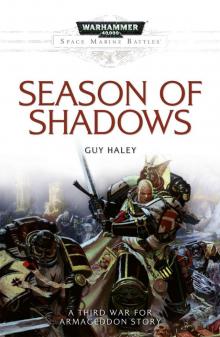 Season of Shadows - Guy Haley
Season of Shadows - Guy Haley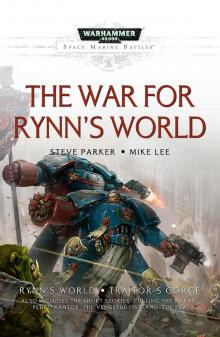 The War for Rynn's World - Steve Parker & Mike Lee
The War for Rynn's World - Steve Parker & Mike Lee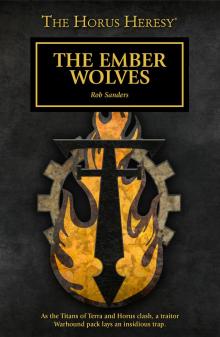 The Ember Wolves - Rob Sanders
The Ember Wolves - Rob Sanders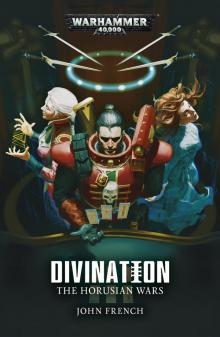 Divination - John French
Divination - John French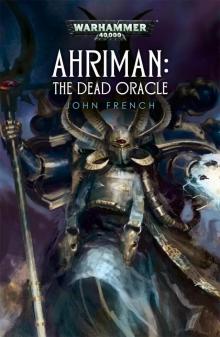 The Dead Oracle - John French
The Dead Oracle - John French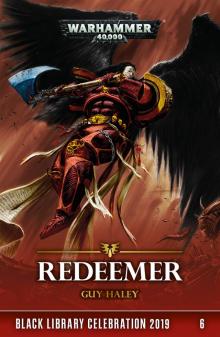 Redeemer - Guy Haley
Redeemer - Guy Haley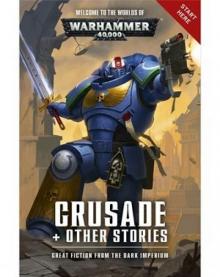 Crusade & Other Stories - Dan Abnett Et Al.
Crusade & Other Stories - Dan Abnett Et Al.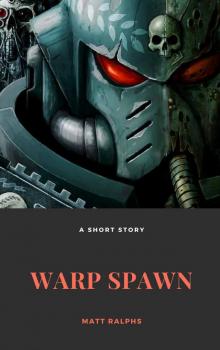 Warp Spawn - Matt Ralphs
Warp Spawn - Matt Ralphs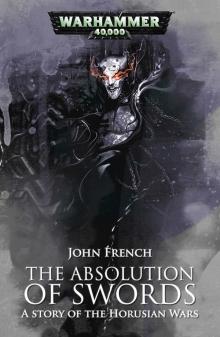 The Absolution of Swords - John French
The Absolution of Swords - John French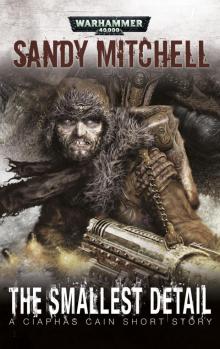 The Smallest Detail - Sandy Mitchell
The Smallest Detail - Sandy Mitchell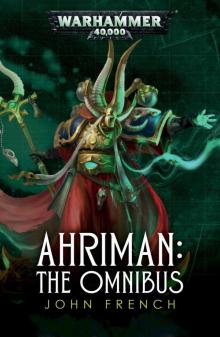 The Omnibus - John French
The Omnibus - John French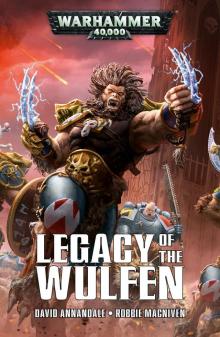 Legacy of the Wulfen - David Annandale & Robbie MacNiven
Legacy of the Wulfen - David Annandale & Robbie MacNiven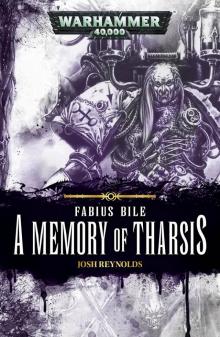 A Memory of Tharsis - Josh Reynolds
A Memory of Tharsis - Josh Reynolds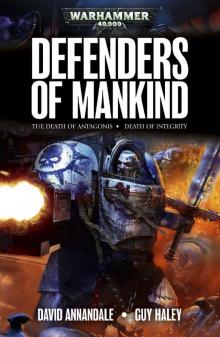 Defenders of Mankind - David Annandale & Guy Haley
Defenders of Mankind - David Annandale & Guy Haley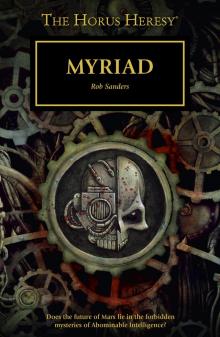 Myriad - Rob Sanders
Myriad - Rob Sanders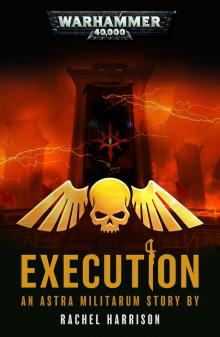 Execution - Rachel Harrison
Execution - Rachel Harrison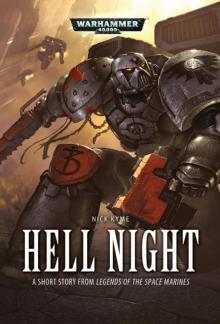 Hell Night - Nick Kyme
Hell Night - Nick Kyme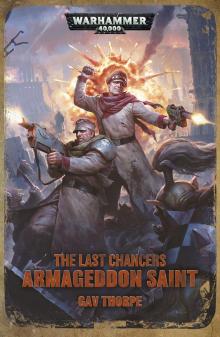 Armageddon Saint - Gav Thorpe
Armageddon Saint - Gav Thorpe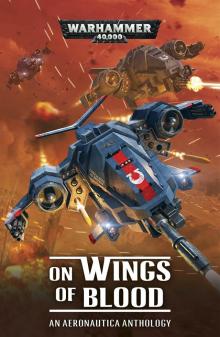 On Wings of Blood
On Wings of Blood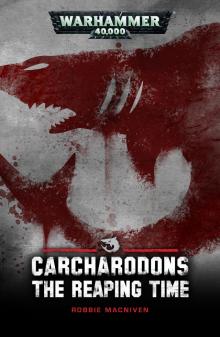 The Reaping Time - Robbie MacNiven
The Reaping Time - Robbie MacNiven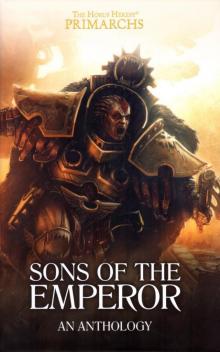 Sons of the Emperor
Sons of the Emperor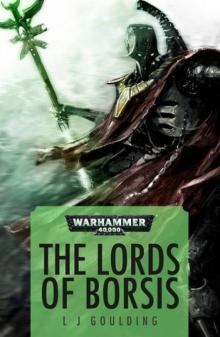 The Lords of Borsis - L J Goulding
The Lords of Borsis - L J Goulding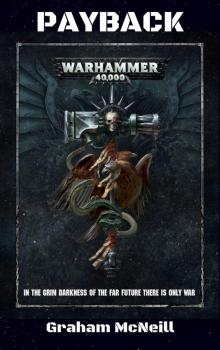 Payback - Graham McNeill
Payback - Graham McNeill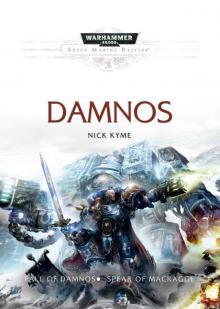 Damnos - Nick Kyme
Damnos - Nick Kyme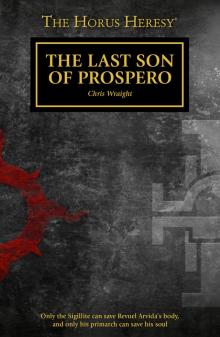 The Last Son of Prospero - Chris Wraight
The Last Son of Prospero - Chris Wraight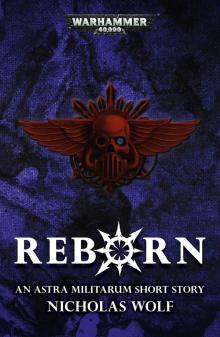 Reborn - Nicholas Wolf
Reborn - Nicholas Wolf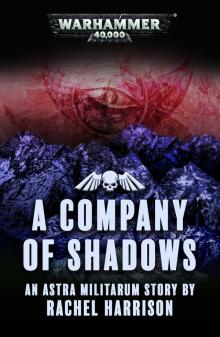 A Company of Shadows - Rachel Harrison
A Company of Shadows - Rachel Harrison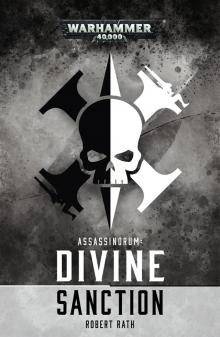 Assassinorum- Divine Sanction - Robert Rath
Assassinorum- Divine Sanction - Robert Rath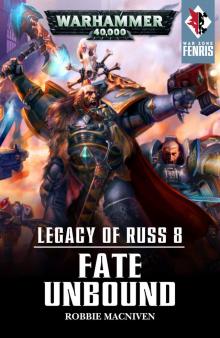 Fate Unbound - Robbie MacNiven
Fate Unbound - Robbie MacNiven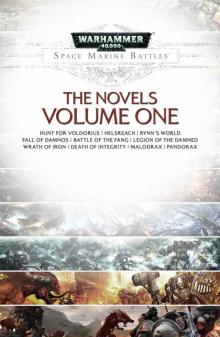 Space Marine Battles - the Novels Volume 1
Space Marine Battles - the Novels Volume 1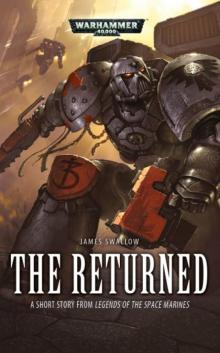 The Returned - James Swallow
The Returned - James Swallow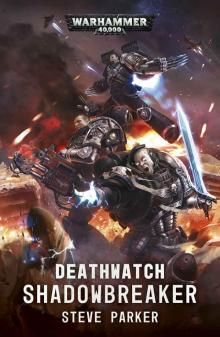 Shadowbreaker - Steve Parker
Shadowbreaker - Steve Parker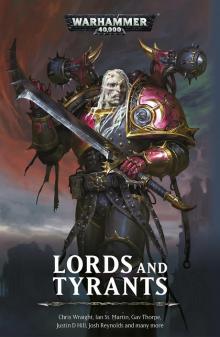 Lords and Tyrants
Lords and Tyrants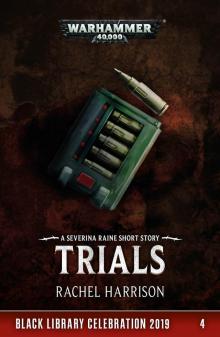 Trials - Rachel Harrison
Trials - Rachel Harrison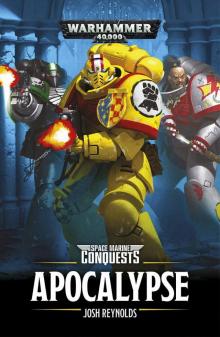 Apocalypse - Josh Reynolds
Apocalypse - Josh Reynolds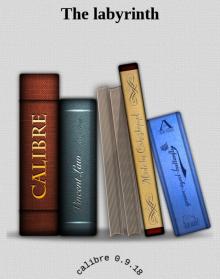 The labyrinth - Richard Ford
The labyrinth - Richard Ford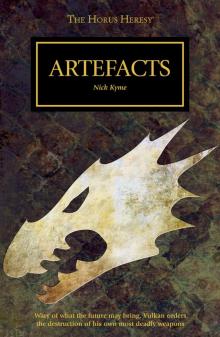 Artefacts - Nick Kyme
Artefacts - Nick Kyme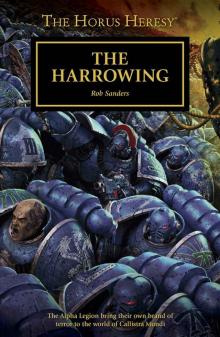 The Harrowing - Rob Sanders
The Harrowing - Rob Sanders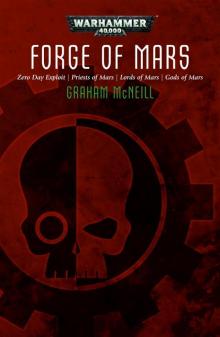 Forge of Mars - Graham McNeill
Forge of Mars - Graham McNeill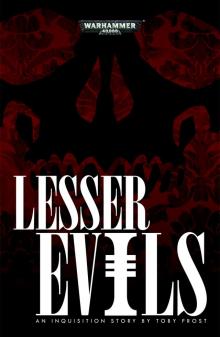 Lesser Evils - Toby Frost
Lesser Evils - Toby Frost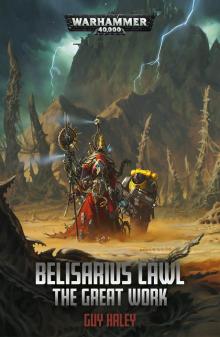 Belisarius Cawl- the Great Work - Guy Haley
Belisarius Cawl- the Great Work - Guy Haley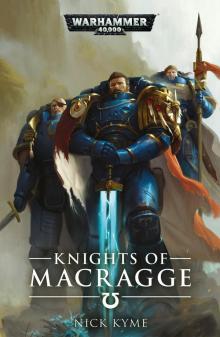 Knights of Macragge - Nick Kyme
Knights of Macragge - Nick Kyme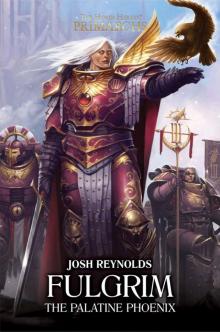 Fulgrim- The Palatine Phoenix - Josh Reynolds
Fulgrim- The Palatine Phoenix - Josh Reynolds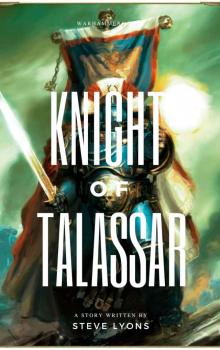 Knight of Talassar - Steve Lyons
Knight of Talassar - Steve Lyons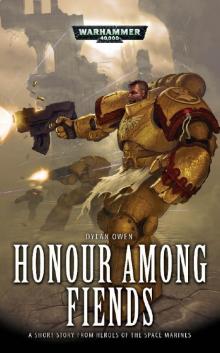 Honour Among Fiends - Dylan Owen
Honour Among Fiends - Dylan Owen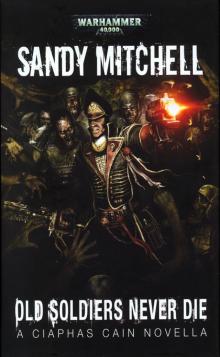 Old Soldiers Never Die - Sandy Mitchell
Old Soldiers Never Die - Sandy Mitchell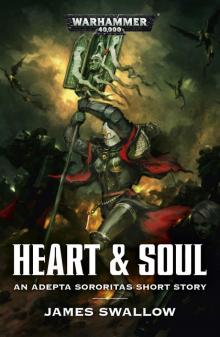 Heart & Soul - James Swallow
Heart & Soul - James Swallow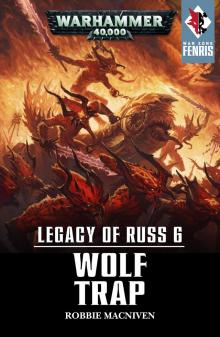 Wolf Trap - Robbie MacNiven
Wolf Trap - Robbie MacNiven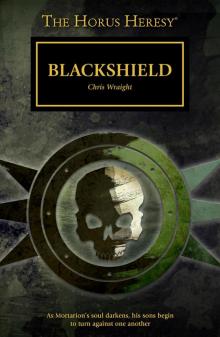 Blackshield - Chris Wraight
Blackshield - Chris Wraight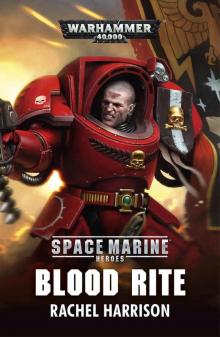 Blood Rite - Rachel Harrison
Blood Rite - Rachel Harrison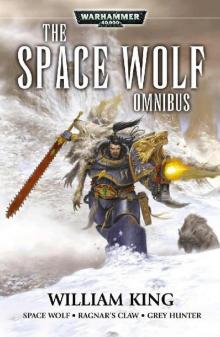 The Space Wolf Omnibus - William King
The Space Wolf Omnibus - William King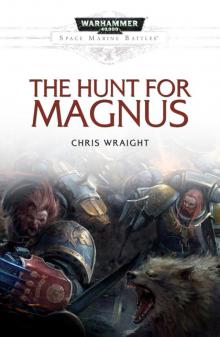 The Hunt for Magnus - Chris Wraight
The Hunt for Magnus - Chris Wraight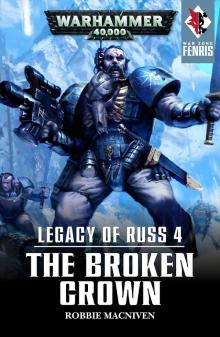 The Broken Crown - Robbie MacNiven
The Broken Crown - Robbie MacNiven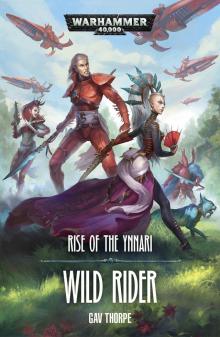 Wild Rider - Gav Thorpe
Wild Rider - Gav Thorpe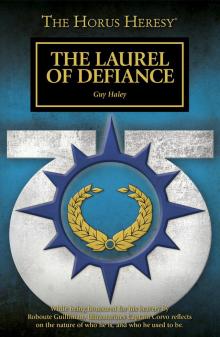 The Laurel of Defiance - Guy Haley
The Laurel of Defiance - Guy Haley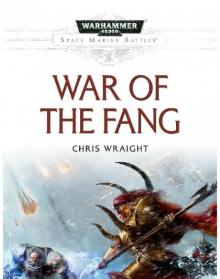 War of the Fang - Chris Wraight
War of the Fang - Chris Wraight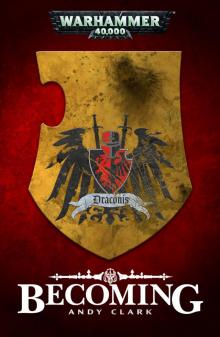 Becoming - Andy Clark
Becoming - Andy Clark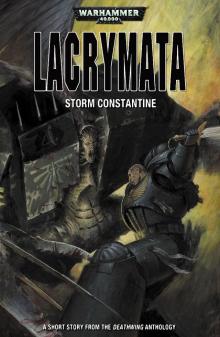 Lacrymata - Storm Constantine
Lacrymata - Storm Constantine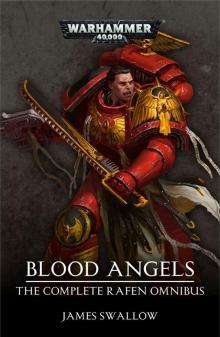 Blood Angels - The Complete Rafen Omnibus - James Swallow
Blood Angels - The Complete Rafen Omnibus - James Swallow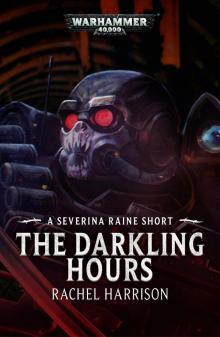 The Darkling Hours - Rachel Harrison
The Darkling Hours - Rachel Harrison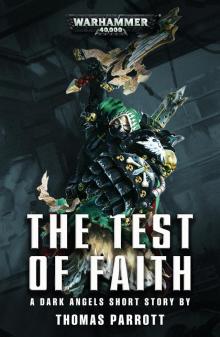 The Test of Faith - Thomas Parrott
The Test of Faith - Thomas Parrott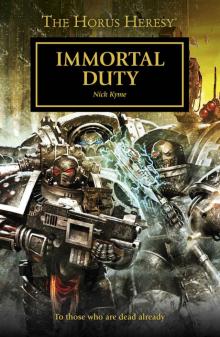 Immortal Duty - Nick Kyme
Immortal Duty - Nick Kyme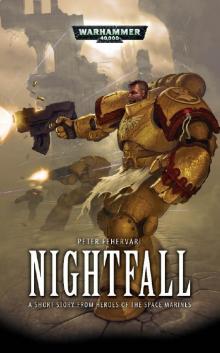 Nightfall - Peter Fehervari
Nightfall - Peter Fehervari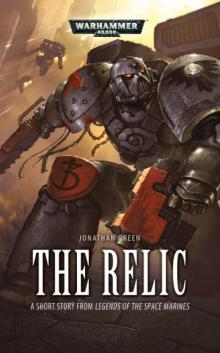 The Relic - Jonathan Green
The Relic - Jonathan Green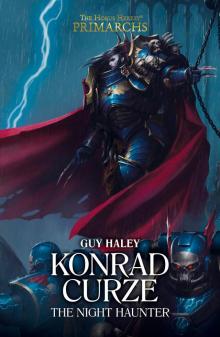 Konrad Curze the Night Haunter - Guy Haley
Konrad Curze the Night Haunter - Guy Haley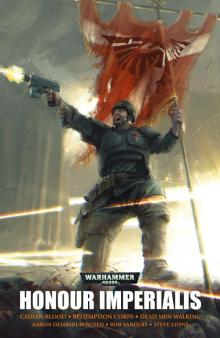 Honour Imperialis - Aaron Dembski-Bowden
Honour Imperialis - Aaron Dembski-Bowden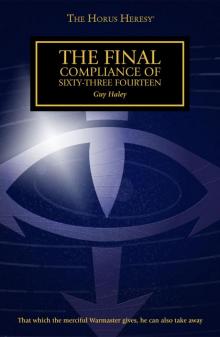 The Final Compliance of Sixty-Three Fourteen - Guy Haley
The Final Compliance of Sixty-Three Fourteen - Guy Haley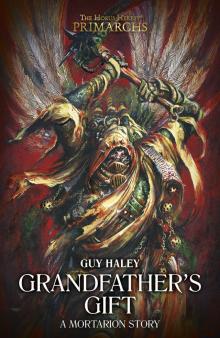 Grandfather’s Gift - Guy Haley
Grandfather’s Gift - Guy Haley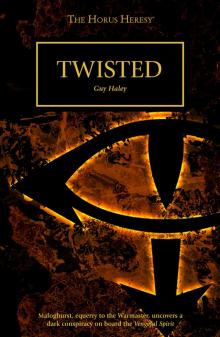 Twisted - Guy Haley
Twisted - Guy Haley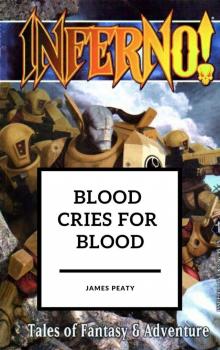 Blood Cries for Blood - James Peaty
Blood Cries for Blood - James Peaty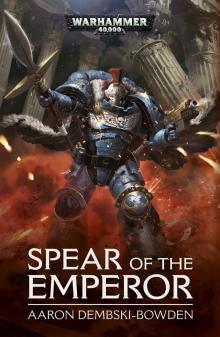 Spear of the Emperor - Aaron Dembski-Bowden
Spear of the Emperor - Aaron Dembski-Bowden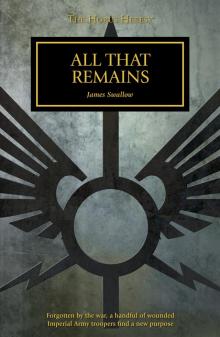 All That Remains - James Swallow
All That Remains - James Swallow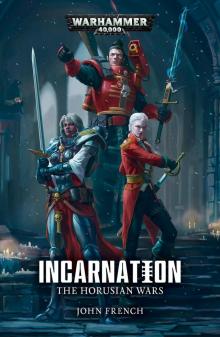 Incarnation - John French
Incarnation - John French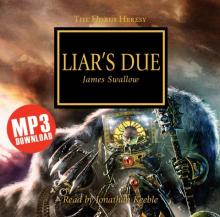 Liar's Due - Ben Swallow
Liar's Due - Ben Swallow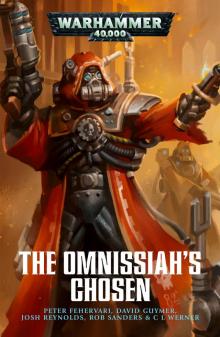 The Omnissiah's Chosen - Peter Fehervari
The Omnissiah's Chosen - Peter Fehervari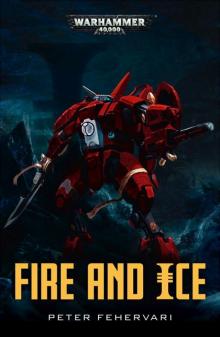 Fire and Ice - Peter Fehervari
Fire and Ice - Peter Fehervari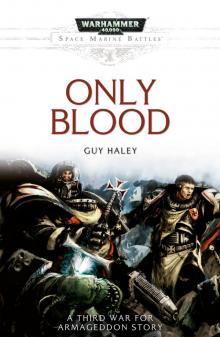 Only Blood - Guy Haley
Only Blood - Guy Haley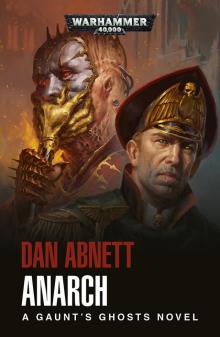 Anarch - Dan Abnett
Anarch - Dan Abnett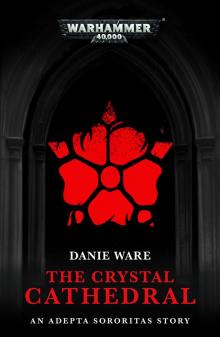 The Crystal Cathedral - Danie Ware
The Crystal Cathedral - Danie Ware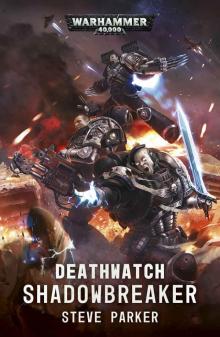 Shadowbreaker
Shadowbreaker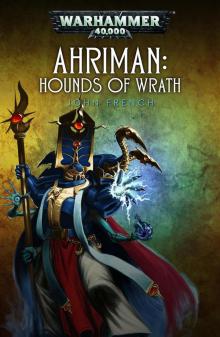 Hounds of Wrath - John French
Hounds of Wrath - John French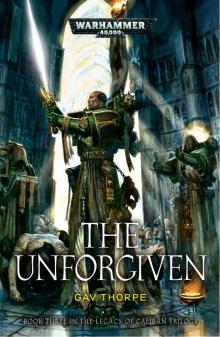 The Unforgiven - Gav Thorpe
The Unforgiven - Gav Thorpe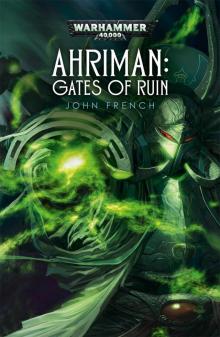 Gates of Ruin - John French
Gates of Ruin - John French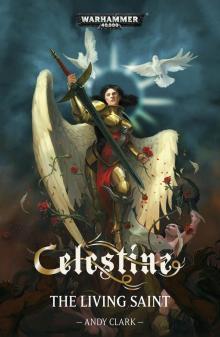 Celestine - Andy Clark
Celestine - Andy Clark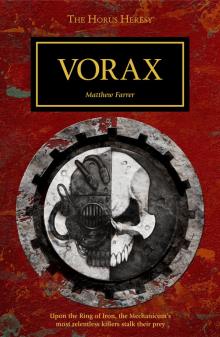 Vorax - Matthew Farrer
Vorax - Matthew Farrer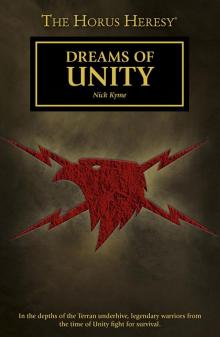 Dreams of Unity - Nick Kyme
Dreams of Unity - Nick Kyme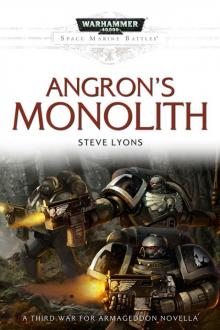 Angron's Monolith - Steve Lyons
Angron's Monolith - Steve Lyons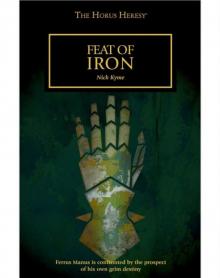 Feat of Iron - Nick Kyme
Feat of Iron - Nick Kyme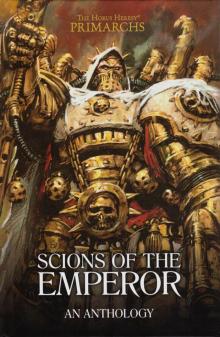 Scions of the Emperor
Scions of the Emperor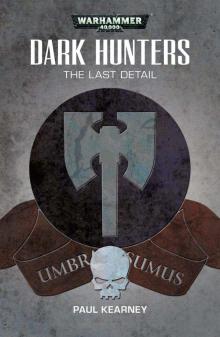 The Last Detail - Paul Kearney
The Last Detail - Paul Kearney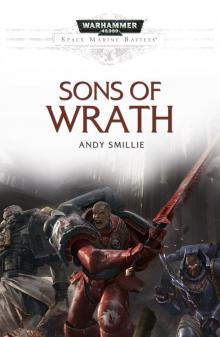 Sons of Wrath - Andy Smillie
Sons of Wrath - Andy Smillie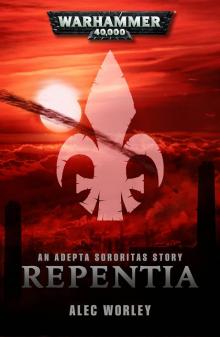 Repentia - Alec Worley
Repentia - Alec Worley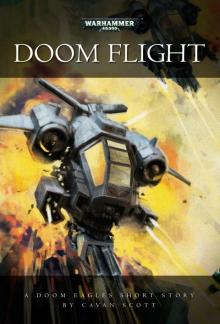 Doom Flight - Cavan Scott
Doom Flight - Cavan Scott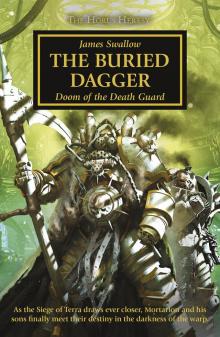 The Buried Dagger - James Swallow
The Buried Dagger - James Swallow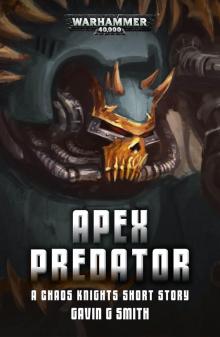 Apex Predator - Gavin G Smith
Apex Predator - Gavin G Smith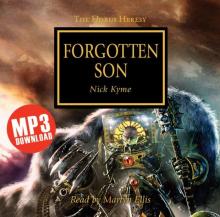 Forgotten Sons - Nick Kyme
Forgotten Sons - Nick Kyme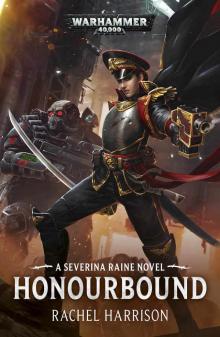 Honourbound - Rachel Harrison
Honourbound - Rachel Harrison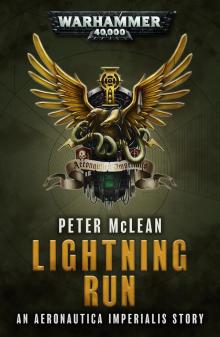 Lightning Run - Peter McLean
Lightning Run - Peter McLean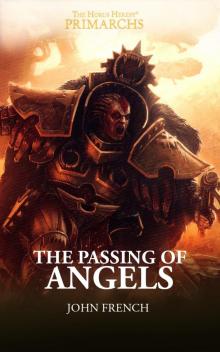 The Passing of Angels - John French
The Passing of Angels - John French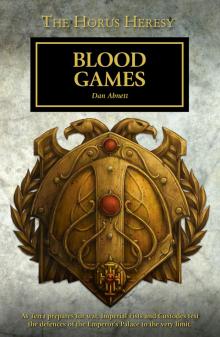 Blood Games - Dan Abnett
Blood Games - Dan Abnett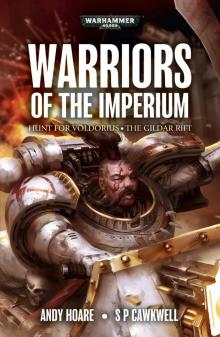 Warriors of the Imperium - Andy Hoare & S P Cawkwell
Warriors of the Imperium - Andy Hoare & S P Cawkwell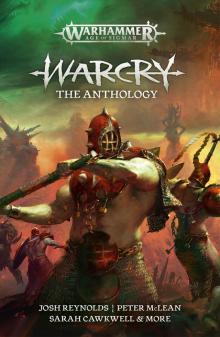 Warcry
Warcry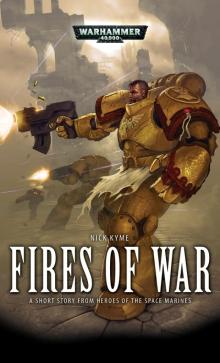 Fires of War - Nick Kyme
Fires of War - Nick Kyme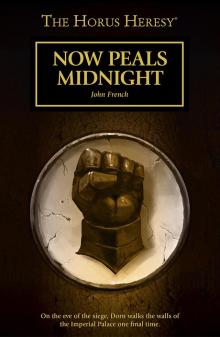 Now Peals Midnight - John French
Now Peals Midnight - John French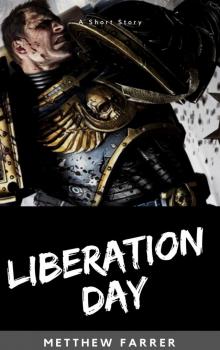 Liberation Day - Matthew Farrer
Liberation Day - Matthew Farrer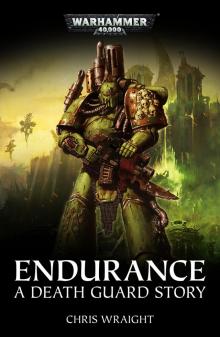 Endurance - Chris Wraight
Endurance - Chris Wraight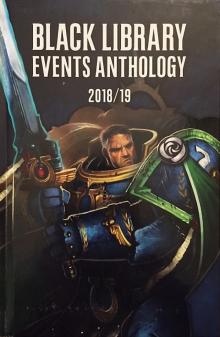 Black Library Events Anthology 2018-19
Black Library Events Anthology 2018-19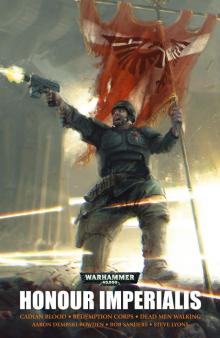 Honour Imperialis - Braden Campbell & Aaron Dembski-Bowden & Chris Dows & Steve Lyons & Rob Sanders
Honour Imperialis - Braden Campbell & Aaron Dembski-Bowden & Chris Dows & Steve Lyons & Rob Sanders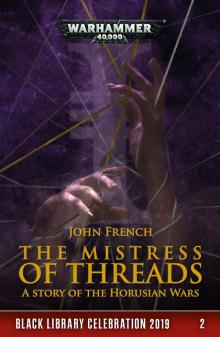 The Mistress of Threads - John French
The Mistress of Threads - John French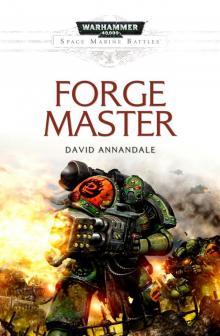 Forge Master - David Annandale
Forge Master - David Annandale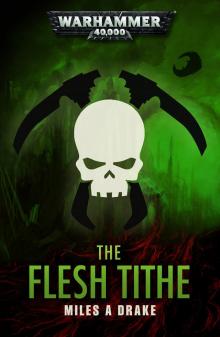 The Flesh Tithe - Miles A Drake
The Flesh Tithe - Miles A Drake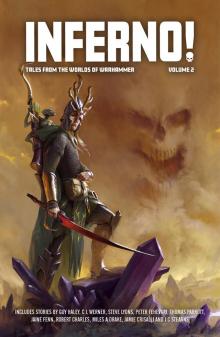 Inferno Volume 2 - Guy Haley
Inferno Volume 2 - Guy Haley Mercy of the Dragon - Nick Kyme
Mercy of the Dragon - Nick Kyme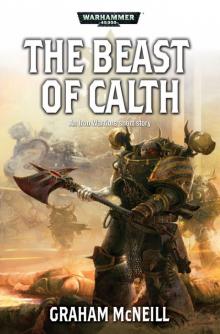 The Beast of Calth - Graham McNeill
The Beast of Calth - Graham McNeill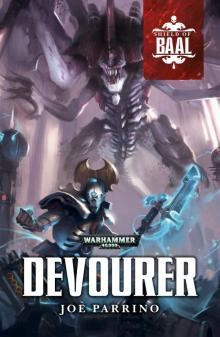 Devourer - Joe Parrino
Devourer - Joe Parrino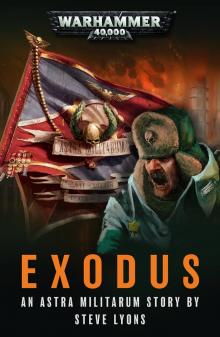 Exodus - Steve Lyons
Exodus - Steve Lyons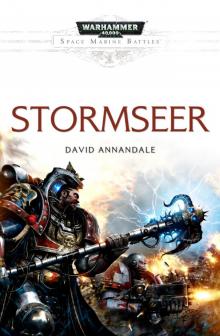 Stormseer - David Annandale
Stormseer - David Annandale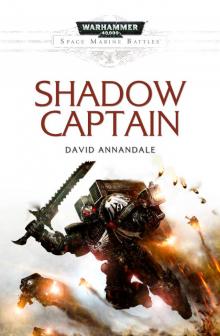 Shadow Captain - David Annandale
Shadow Captain - David Annandale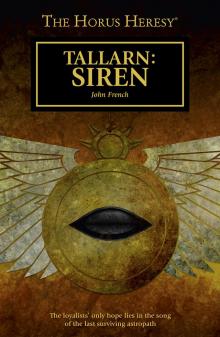 Tallarn- Siren - John French
Tallarn- Siren - John French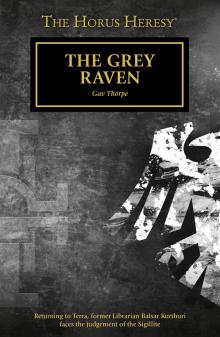 The Grey Raven - Gav Thorpe
The Grey Raven - Gav Thorpe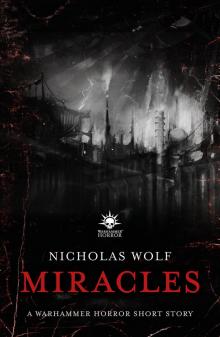 Miracles - Nicholas Wolf
Miracles - Nicholas Wolf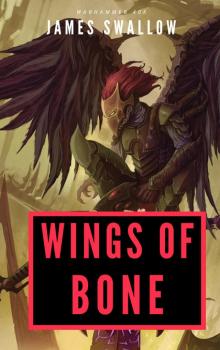 Wings of Bone - James Swallow
Wings of Bone - James Swallow